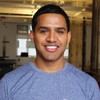An example of L. Ron Hubbard's genius at work. Image: author
Seeing shrines and literature dedicated to a man named Ron opened my eyes to the idea that truly anyone can start a religion.
The results of my first personality test. Image: author
God damn confusing. That's all it is.
Men follow those they respect. And history proves it.
While it dismisses psychiatry, Scientology promises to let you see your own thoughts. I have no idea how this machine works.
Note: Coffee is 25 cents cheaper if you join the Church of Scientology. Image: author
